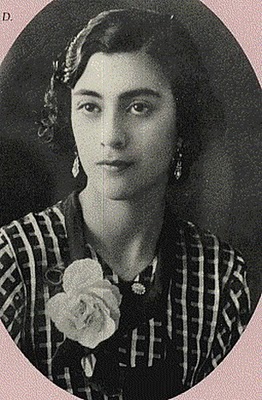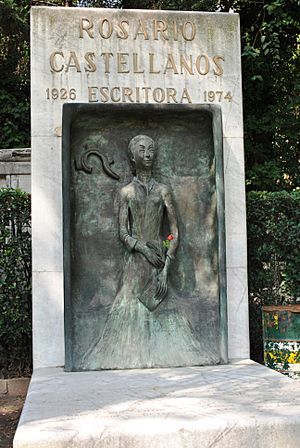Rosario Castellanos facts for kids
Quick facts for kids
Rosario Castellanos
|
|
|---|---|
 |
|
| Born | 25 May 1925 Mexico City, Mexico |
| Died | 7 August 1974 (aged 49) Tel Aviv, Israel |
| Occupation | Poet, novelist, cultural promoter and diplomat |
| Language | Spanish |
| Education | National Autonomous University of Mexico (Philosophy and Letters) |
| Literary movement | Generation of 1950 |
| Notable awards | Xavier Villaurrutia Award (1960) |
| Spouse | Ricardo Guerra Tejada |
Rosario Castellanos Figueroa (born May 25, 1925 – died August 7, 1974) was a famous Mexican poet and writer. She was one of Mexico's most important literary voices in the 20th century. Rosario wrote powerfully about unfair treatment based on culture and gender.
Her work has greatly influenced ideas about women's rights and cultural studies in Mexico. Even though she passed away young, she helped open doors for women in Mexican literature. Her legacy, or what she left behind, is still important today.
Contents
Rosario Castellanos' Early Life
Rosario Castellanos was born in Mexico City, Mexico. She grew up in Comitán, a town close to her family's ranch in the southern state of Chiapas. As a child, she was quiet and thoughtful. She noticed how hard the Maya people, who worked for her family, struggled.
Her family's situation changed when President Lázaro Cárdenas started a new policy. This policy gave land to peasants and took away much of her family's land. When Rosario was fifteen, she and her parents moved to Mexico City. In 1948, both of her parents died in an accident. This left her an orphan at 23 years old.
Becoming a Writer and Activist
Even though she was still quiet, Rosario joined a group of smart people from Mexico and Central America. She read many books and started to write her own stories and poems. She studied philosophy and literature at the National Autonomous University of Mexico (UNAM). She later taught there too.
Rosario also worked for the National Indigenous Institute. She wrote plays for puppet shows that were put on in poor areas. These shows helped people learn to read. She also wrote a weekly column for a newspaper called Excélsior.
In 1958, she married Ricardo Guerra Tejada, who was a philosophy professor. The birth of their son, Gabriel Guerra Castellanos, in 1961 was a very happy moment for Rosario. Before he was born, she had faced sadness after losing other pregnancies. Rosario and Ricardo later divorced after thirteen years.
Rosario's personal life was sometimes difficult. However, she spent a lot of her time and energy fighting for women's rights. Because of this, she is remembered as an important symbol for women's rights in Latin America.
Besides her writing, Rosario Castellanos also worked for the government. In 1971, she was chosen to be Mexico's ambassador to Israel. This was a way to honor her important contributions to Mexican literature. Rosario passed away in Tel Aviv, Israel, on August 7, 1974, due to an electrical accident.
Rosario Castellanos' Important Works
Throughout her career, Rosario Castellanos wrote many different types of works. She wrote poetry, essays, one major play, and three novels. Her novels include Balún-Canán, Oficio de tinieblas, and Rito de iniciación.
Balún-Canán is partly about her own life. Oficio de tinieblas tells the story of an uprising by the Tzotzil indigenous people in Chiapas. This story was based on a real event from the 1800s. Rito de iniciación is a story about a young woman who discovers she wants to be a writer.
Even though Rosario was not of indigenous descent, her books show great care and understanding for the struggles of indigenous people.
Exploring Themes in Her Stories
Ciudad Real is a collection of short stories published in 1960. In these stories, Rosario Castellanos mainly focused on the differences between groups of people. She wrote about the differences between white people and indigenous people. She also wrote about the differences between men and women.
Communication is a very important idea in Rosario's work. Ciudad Real shows the problems between the native people of Chiapas, Mexico and the white people. They could not talk to each other and did not trust each other because they spoke different languages. These ideas often appear in her stories, along with themes of people feeling lonely and left out.
However, the last story in Ciudad Real is a bit different. In this story, the main character, Arthur, knows both Spanish and the indigenous language. This helps him break down the barriers between the two groups. At the end, Arthur connects with nature and finds peace. It is the only story in the collection with a happy ending.
Rosario Castellanos admired other famous writers. These included Gabriela Mistral, Emily Dickinson, Simone de Beauvoir, Virginia Woolf, and Simone Weil.
Awards and Honors for Rosario Castellanos
Rosario Castellanos received many awards for her writing. In 1958, she won the Chiapas Award for her novel Balún Canán. Two years later, she received the Xavier Villaurrutia Award for Ciudad Real.
She also won other important awards, such as:
- The Sor Juana Inés de la Cruz Award (1962)
- The Carlos Trouyet Award of Letters (1967)
- The Elías Sourasky Award of Letters (1972)
Many public places have been named after her to honor her memory:
- A park and a public library in the Cuajimalpa de Morelos area of Mexico City.
- The library at the Center for Research and Gender Studies at UNAM.
- One of the gardens at the Faculty of Philosophy and Letters at UNAM.
- The main building of the Economic Culture Fund in Mexico City.
See also
 In Spanish: Rosario Castellanos para niños
In Spanish: Rosario Castellanos para niños
 | Leon Lynch |
 | Milton P. Webster |
 | Ferdinand Smith |


